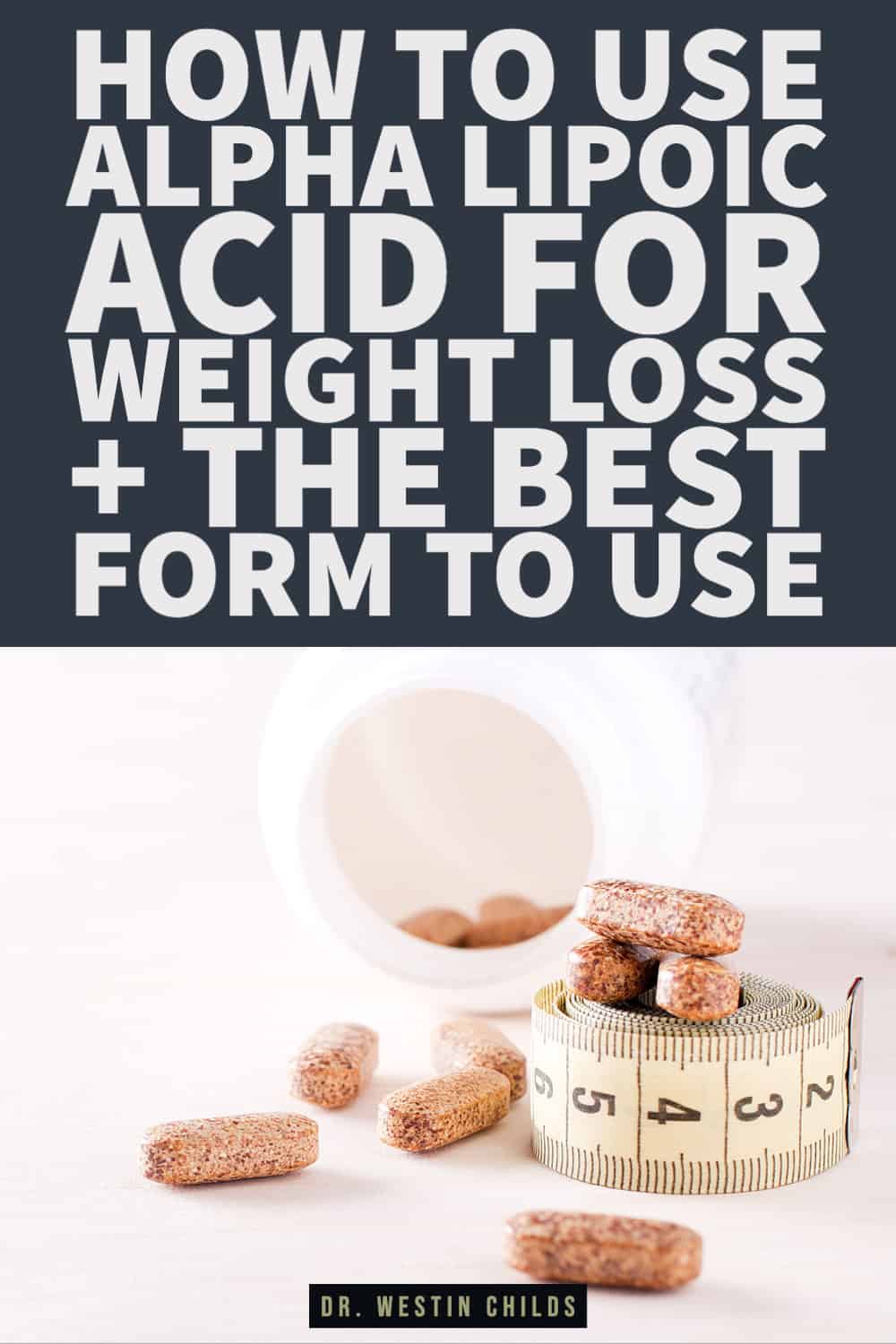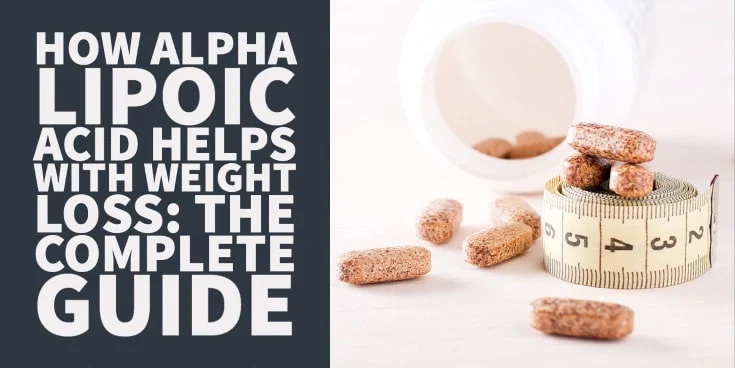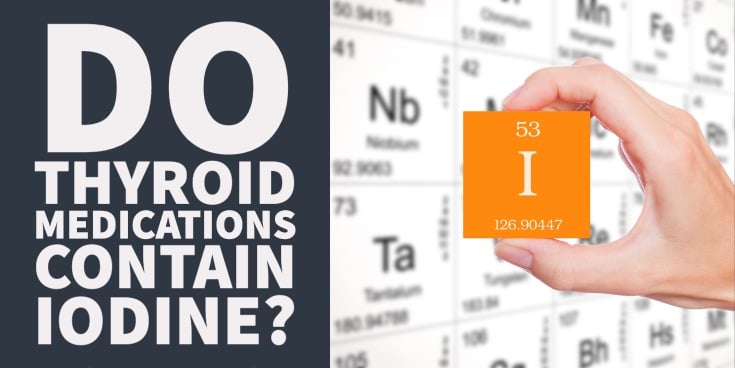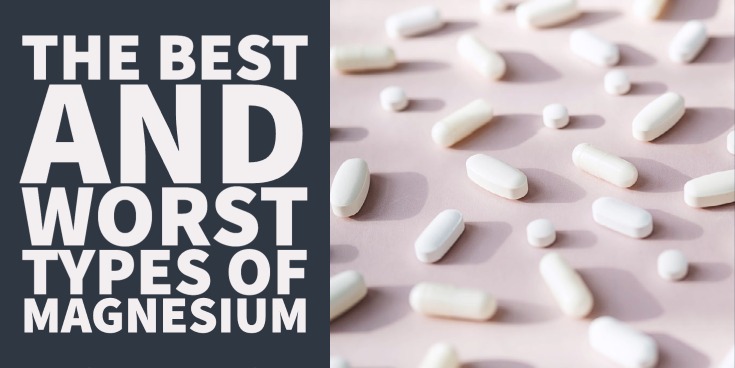When it comes to weight loss there are very few supplements that actually work.
After all, if it were as easy as taking a supplement to lose weight wouldn’t it be on the cover of every national newspaper?
While most of the claims for weight loss with other supplements tend to be overhyped there are actually some supplements that can help you lose weight.
The supplement we are going to be talking about today is Alpha Lipoic acid and how exactly this supplement stands apart from the rest and can help with weight loss.
No, these aren’t miracle weight loss pills – but they act in various ways to help reduce inflammation, and activate mitochondrial energy production to help your body burn fat.
Of course, we will be using a combination of scientific studies and my personal experience to show how ALA can help you lose weight.
Benefits of Alpha Lipoic Acid
Beyond the benefits of weight loss, this nutrient is very powerful.
It’s so powerful that it can be used for a variety of conditions and has been well-studied (as far as supplements go).
In some instances, even conventional doctors have started to use this to treat conditions like peripheral neuropathy! (Now THAT is interesting).
I’m going to talk more about the benefits of weight loss but I want to take a second to describe how I use alpha lipoic acid in my practice.

First:
ALA can be used in conjunction with other supplements (it works better in combination therapy) to help treat and reverse insulin resistance.
Insulin resistance is the driver behind many chronic medical conditions including cardiovascular disease (1), dementia (2), and weight gain (3).
Second:
ALA works particularly well if used to treat weight loss as part of a comprehensive plan.
This means that I will use it in combination with other supplements, hormones, and lifestyle changes for maximum benefit.
Don’t expect to take this supplement by itself and lose a ton of weight. It doesn’t work that way.
Third:
ALA works really well in the setting of insulin resistance, especially if the patient also has evidence of fatty liver disease (we will discuss this below).
I’ve also found great benefits in women who have high levels of testosterone (likely due to insulin resistance).
Obviously, there are many more reasons to use ALA, but these are the three primary patient populations I have personally had the MOST success with.
Below you will find a full list of conditions that alpha lipoic acid has been scientifically shown to help:
- Alzheimer’s disease (4) and other forms of dementia
- Obesity & Weight Loss Resistance <— this is what we are going to be focusing on today
- Non-alcoholic fatty liver disease (5)
- Burning mouth syndrome (6)
- Cardiovascular disease (7)
- Hypertension or High blood pressure (8)
- Peripheral Neuropathy (9)
Now that you have an idea of the potential that this nutrient has for multiple medical conditions let’s talk about how ALA can help with weight loss.
How Alpha Lipoic Acid Influences Weight & Helps with Weight Loss
The weight loss effects of ALA are likely due to multiple different factors.
As you probably are already aware, weight gain and loss are more complex than the simple calories in/calories out model.
Weight gain results from a complex change in hormones usually a direct result of lifestyle disturbances like poor diet (nutritionally deficient), high stress (from a job or other factors), lack of exercise (altering muscle mass), and decreased activity (lack of exercise).
With this in mind, that means supplements (or other therapies) designed to treat weight loss should focus on correcting these hormone imbalances in the body.
This is how supplements can help you lose weight without a change in diet.
With that in mind, let’s talk about how alpha lipoic acid can influence these hormones…
- Bottom Line: Weight gain is due to hormonal changes and effective weight loss therapies target these hormonal imbalances.
#1. Increases Insulin Sensitivity
The effect of alpha-lipoic acid on insulin resistance is probably its most powerful effect in terms of how this supplement influences weight loss.
ALA attenuates (decreases) insulin resistance (10) and helps lower fasting blood sugar (11).
All of these changes are mediated through insulin and insulin resistance.

Why is lowering insulin and blood sugar helpful for weight loss?
First:
Insulin is a growth hormone.
It is responsible for cellular growth, especially fat cells (12).
While helpful in small amounts (it can help regulate blood sugar) high levels of insulin (AKA insulin resistance) lead to weight gain and a number of other chronic conditions.
Couple that with the fact that up to 50% of the US population has some form of insulin resistance and you see why this is important.
Second:
Insulin resistance is often ignored by many physicians UNTIL you present with type II diabetes (13).
But what about patients with pre-diabetes or high fasting insulin levels that don’t meet the criteria for diabetes by blood sugar testing?
These patients are largely left untreated, despite the fact that they still have issues with weight and weight loss resistance.
For this reason, it is very important for you to understand both your fasting blood sugar levels and insulin levels because there are treatments outside of medications that can help lower insulin levels.
Third:
Focusing on diet alone is often not enough to complete reverse insulin resistance and lead to weight loss.
Up to 50% of patients may experience some weight loss when changing to a low-carbohydrate diet, but that leaves 50% of people who need additional therapies for further weight loss.
These therapies can be from either supplements or medications designed to treat and reverse insulin levels.
- Bottom Line: ALA can help to lower insulin levels and reverse insulin resistance in some patients. Because high levels of insulin cause weight gain, low insulin levels are very important for long-term weight loss.
#2. Increases Mitochondrial Energy Production
Alpha lipoic acid is required for proper mitochondrial enzyme function and therefore energy production (14).
Low levels of ALA may slow down mitochondrial energy production leading to several symptoms including the subjective sense of fatigue (or decreased energy) that many people have today.

If you are interested in weight loss then you want proper energy production in mitochondria for several reasons:
First:
Proper energy production helps set your basal metabolic rate (AKA your metabolism).
The constant amount of energy required to keep you alive, breathing, and moving require a lot of energy.
In fact, your basal metabolic rate determines how many calories you burn at rest simply living.
And this amount of calories is significantly more than any calories you burn while exercising.
This means that your metabolism is paramount in terms of importance when trying to lose weight.
Second:
More energy production means a higher sense of subjective energy.
The symptom of “fatigue” is common and plagues many patients.
Taking ALA may help boost energy levels which will allow you to get up and be more active, build more lean muscle mass and further improve your metabolism.
- Bottom Line: ALA may help increase metabolism and energy production through its effects on mitochondrial enzymes.
#3. Reduces Inflammation
ALA has been shown in several studies to help reduce markers of inflammation in the body (specifically hsCRP in this study (15)).
We all know that inflammation is a “bad guy”, but do you really know why?
Or how about why inflammation is bad when you are trying to lose weight?
High levels of inflammation not only impact hormone levels, they directly impact your fat cells.
Your fat cells (like other tissues in your body) can become inflamed, and when they are inflamed the medical term is known as adiposopathy or adipositis.
And inflammation in your fat cells is a big deal.
Here’s why:
Your fat cells do more than just give you cellulite. They are responsible for hormonal signals that tell your brain to burn fat and increase metabolism.
High levels of inflammation lead to dysregulation of these hormones and contribute to the condition known as leptin resistance.

Leptin resistance is one of the main causes of weight loss resistance which basically makes weight loss almost impossible.
In addition to the changes in your fat cells, high levels of inflammation also lead to problems with thyroid function.
Inflammation reduces the conversion of T4 to T3 leading to high levels of reverse T3 – this process further blunts your metabolism and leads to weight gain.
As I’m sure you are aware, proper thyroid function is critical for weight loss because thyroid hormone also has a heavy impact on your metabolism (16) and energy production.
- Bottom Line: ALA helps lower inflammation in the body which can help weight loss by reducing fat cell inflammation and potentially improving thyroid function.
#4. The combination of Alpha Lipoic Acid + Prescription Medications Boosts Weight Loss
As mentioned previously one of the best ways to use Alpha lipoic acid is as part of a comprehensive treatment plan that includes medications and/or other supplements.
This synergy is emphasized in several studies…
The First study:
This study showed that the combination of testosterone + alpha lipoic acid (17) in type II diabetic patients resulted in significant improvement in multiple parameters.

These patients experienced a reduction in BMI (weight loss), an improvement in glycemic control (lower blood sugar levels), an improvement in lipid profile (lower cholesterol), and an improvement in libido (sex drive).
This combination therapy is particularly interesting considering that many patients (both men and women) have a combination of low testosterone plus insulin resistance.
Alpha lipoic acid may promote an increase in testosterone by virtue of its insulin-lowering effects.
The Second study:
In this study, researchers compared the effects of metformin therapy vs metformin + alpha lipoic acid in patients with insulin resistance.
This study showed that patients using both metformin plus alpha lipoic acid had more weight loss, better cholesterol, and a reduction in blood sugar compared to metformin alone.

This is actually a big deal if you are a patient with insulin resistance, considering that much of your treatment is reliant upon your practitioner.
The addition of alpha lipoic acid might have other benefits when coupled with other therapies, medications, and hormones.
In my practice, I’ve also noted a similar benefit with combination therapy and this is how I would recommend you consider supplementing (compared to taking the supplement by itself).
- Bottom Line: ALA can provide a synergistic effect on weight loss, cholesterol, and blood sugar when combined with other medications and hormones like Testosterone and Metformin.
How to use ALA for the Best Results
If you’ve read through this post so far and you feel that alpha lipoic acid may have some benefit then the following information may help guide you further.
When supplementing with ALA there are a few things to consider:
Alpha lipoic acid generally has more benefits when it is in a sustained release or delayed release form.
This allows for a sustained level of alpha lipoic acid to be absorbed throughout the day.
In addition, it is also important to make sure that your dose is high enough to get symptomatic improvement.
Below we are going to discuss everything you need to know before you start supplementing with ALA.
How to Supplement with Alpha Lipoic Acid
- If you are taking it alone then doses up to 1,800mg per day may be necessary (depending on tolerance).
- Start titration at 600mg per day and increase as tolerated.
- I find better success combining and adding alpha lipoic acid to berberine. If you use this method then you can get by using less of each. A supplement such as this is ideal.
- Length of treatment may vary depending on the condition but should last for several months at least.
Make sure the Dosage is high enough
If you opt to use alpha lipoic acid on its own then you will need higher doses to get the desired effects. In this case, your dosage should range from 600mg to 1,800mg.
In some cases, doses as high as 2,400mg per day may be necessary.
Use this as a general guide based on your medical condition…
Dosage for peripheral neuropathy: 600mg per day minimum for 3+ months
Dosage for insulin resistance: 1,200mg per day x 6+ months
Dosage for weight loss: 1,800mg per day x3 months minimum and should be combined with other therapies, medications, and hormones for optimal results.
The length of therapy largely depends on your condition but you should expect to use ALA for at least 3 months minimum and up to 6+ months if you are getting improvement.
Remember, whenever possible, your ALA should be in a sustained release form.
Side effects to watch out for
Alpha lipoic acid is generally very well tolerated with few side effects.
The most common side effects include itching, small rashes, and/or urticaria (hives).
These changes usually occur at only higher doses (typically 1,800mg or higher), but can occur at lower levels as well.
In my opinion, many of these side effects are due to a “detox”-like reaction from ALA’s action as an anti-oxidant.
It doesn’t mean that these side effects are necessarily bad but instead may represent a purging of various breakdown products stored in adipose tissue (18).
Adding other supplements to boost results
Just like other medications can be added to ALA to boost results, so too can supplements be added to ALA for even more benefit.
Recall that I generally do not recommend the use of ALA in isolation, so if you know what your medical condition is you can target it with the addition of these supplements.
R-Lipoic Acid vs L-Lipoic Acid: What’s the Difference & Does it Matter?
If you spend any time in the literature (or on the internet) then you are probably aware that there are two forms of alpha lipoic acid.
Alpha lipoic acid forms two different enantiomers which are essentially mirror images of each other.
You can think of enantiomers as gloves, one for the right hand and one for the left hand.
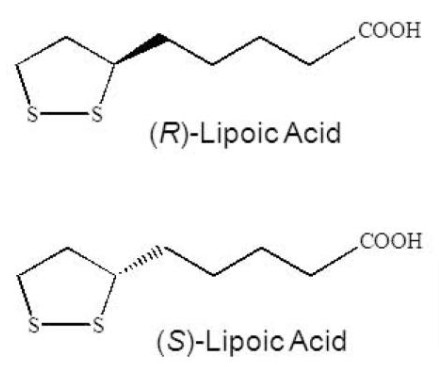
They are basically the same but fitting a left-handed glove on your right hand doesn’t work quite right just like fitting a right-handed glove on your left hand doesn’t.
The same sort of thing is true in biology with enantiomers.
These different forms of alpha lipoic acid known as R-LA and S-LA are very similar but do have slightly different effects on the body and cells.
This begs the question:
Is one form better than the other and should you focus on one enantiomer over the other?
Yes and no.
There have been a handful of studies which show suggest that the R-LA is better absorbed and utilized by the body and may, therefore, be a better supplement.
But this isn’t the full story.
While it is true that R-LA may be better used by the body, the L-LA enantiomer helps to prevent the binding of R-LA to itself which may increase the bioavailability and use of the more potent enantiomer (19).
If that sounds like mumbo jumbo, let me break it down:
Right now it looks like it’s better to take a mixture of both enantiomers because even though one is more powerful than the other, the one that is less powerful helps the one that is more powerful make it into your body.
The reason this matters is because alpha lipoic acid supplements come in a salt form which contains a racemic mixture of equal parts R-LA and S-LA.
If it is the case that one version is better than the other then it makes sense to try to get more of that version.
The truth is that right now there isn’t enough evidence to suggest that you should use one form over the other and there’s more evidence to suggest that taking both is probably the way to go.
For this reason, I recommend sticking with the alpha lipoic acid salt form which contains equal combinations of both R-LA and S-LA.
Other supplements designed to treat insulin resistance:
- Chromium: Chromium helps reduce insulin sensitivity. Your dose should be 500mcg per day.
- Magnesium: Magnesium helps in a number of ways but can also help weight loss (read more here), start with 200mg per day and titrate up as needed.
- Berberine: This supplement has been shown to be as powerful as metformin at lowering blood sugar (19) and Hgb A1c. Use up to 2,000mg per day for maximum benefit.
- For best results combine 3+ supplements targeted at insulin resistance, blood sugar, and for weight loss.
Other supplements designed to lower inflammation:
Patients with non-specific inflammation generally have markers such as CRP, ESR and hs-CRP elevated on their blood tests.
These inflammatory markers are frequently accompanied by insulin resistance, leptin resistance, and weight gain (for reasons stated above).
When inflammation is present treat aggressively with 2-3+ anti-inflammatory supplements:
- Omega 3 fatty acids: Helps reduce inflammatory cytokines. Your dose should be up to 2 grams per day.
- Curcumin: Works by activating PPAR-gamma levels to reduce inflammation, and also has been shown to delay the onset of type II diabetes from pre-diabetes. Your dose should be up to 1,000mg per day in a sustained release form.
- Quercetin with Bromelain: Powerful antioxidant that can help boost immune function and is especially helpful in patients with GI problems and/or a chronic runny nose.
Foods High in Alpha Lipoic Acid
If you prefer to try and get ALA through your diet then I’ve also included a list of recommended foods naturally high in ALA.
Foods high in ALA:
- Spinach
- Organ meats like liver, kidney, and heart
- Brussel sprouts
- Broccoli
It should be noted that the sources of ALA in these foods may be somewhat limited, and patients with serious medical conditions will likely need higher or supraphysiologic doses of these supplements for maximum benefit.
This means a combination of ALA supplements plus foods high in ALA may be the best approach versus eating foods high in ALA alone.
Recap & Final Thoughts
Alpha lipoic acid is a very strong nutritional supplement that can help with multiple medical conditions.
Due to its various effects on inflammation, hormones, and insulin, and acting as an anti-oxidant this supplement can actually help with weight loss as well.
To get the most benefit from using ALA make sure you find a high-quality supplement without added fillers/dyes, in a sustained release form, and in a high enough dose.
This will help you achieve your desired results.
Also, remember that ALA can be combined with other medications and hormones like testosterone and Metformin to boost weight loss results.
Now it’s your turn:
Are you using alpha lipoic acid?
Has it helped you with weight loss?
Why or why not?
Leave your questions or comments below!
